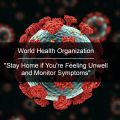Human Metapneumovirus (HMPV) is a respiratory virus, first identified in 2001, that causes respiratory infections similar to the common cold.
Belonging to the Pneumoviridae family, which includes the Respiratory Syncytial Virus (RSV), HMPV affects people of all ages but is particularly severe in young children, older adults, and those with weakened immune systems.
Symptoms of Human Metapneumovirus
HMPV symptoms are akin to those of a cold and include:
- Coughing
- Fever
- Nasal congestion
- Sore throat
- Wheezing
- Shortness of breath
More severe cases can lead to:
Bronchiolitis: Inflammation of small airways in the lungs, common in infants.
Bronchitis: Inflammation of the bronchial tubes.
Pneumonia: A serious lung infection, particularly dangerous for vulnerable populations.
Asthma exacerbation: Worsening of asthma symptoms.
While most HMPV cases are mild, severe cases can occur, especially in:
Infants and young children: Higher risk of developing bronchiolitis and pneumonia.
Older adults: Individuals over 65 are more likely to experience severe respiratory issues.
People with weakened immune systems: Those with chronic illnesses or compromised immunity are at higher risk.
Prevention of HMPV
There is no vaccine for HMPV, so prevention relies on reducing infection and transmission risks. Key preventive measures include:
1. Hand hygiene: Regular hand washing with soap and water for at least 20 seconds.
2. Respiratory etiquette: Covering mouth and nose with a tissue or elbow when coughing or sneezing.
3. Avoiding close contact: Staying away from sick individuals and maintaining distance if unwell.
4. Cleaning surfaces: Disinfecting frequently touched objects and surfaces regularly.
5. Wearing a mask: Using masks when sick or in crowded places. By practicing these measures, you can help minimize the spread of HMPV and protect yourself and others.
HMPV, though a common respiratory virus, can lead to severe illness in certain populations. Recognizing symptoms, understanding severe cases, and adhering to preventive measures are vital in mitigating the impact of HMPV. Staying informed, maintaining good hygiene, and taking care of your health are key to staying safe from HMPV and other respiratory infections.

